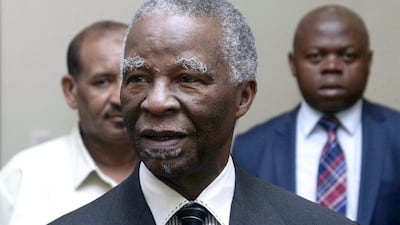Four members of the umbrella opposition group Sudan Call – the National Umma Party, Sudan People’s Liberation Movement North, Justice and Equality Movement and Sudan Liberation Movement – have signed the road map agreement for peace and dialogue.
The groups rejected the road map agreement in March, but eventually came round after receiving reassurances from the head of the African Union High-Level Implementation panel on Sudan, Thabo Mbeki.
The issue caught the attention of The National's Arabic-language sister paper Aletihad, and its columnist Hilmi Sharawy, who has previously discussed the repercussions of the African Union's resolution to dispatch regional intervention – not just peacekeeping – forces to South Sudan.
Sharawy wrote that such a move merits further follow-up whether in North Africa or in the Levant. He noted that Mr Mbeki and Ethiopia were not the only ones behind the latest moves. There was, he said, a hidden element: the United States envoy “who went back and forth among the different parties in a bid to bring the ‘national dialogue’ to fruition”.
Writing in the pan-Arab daily newspaper Al Hayat, Mohammed Jameel Ahmed said the signing of the road map agreement between the Sudan Call groups and the Sudanese government was, perhaps, further proof of Sudan's weariness of war more than a political opportunity to settle the issues of peace and democracy in the country.
“In the absence of substantial indications of any transition in the balance of power between both parties, and in light of these parties’ almost absolute desperation at the futility of politics, it was apparent that there were certain external arrangements reflecting on the progress of the road map agreement,” he wrote.
These arrangements, the Sudanese columnist opined, were akin to bartering brought about by international interests and are “a result of pressures that are completely void of any solid ground for making peace among the options of both parties”.
Following the signing of the road map agreement, Sudan Liberation Movement leader Minni Minnawi admitted to a Sudanese newspaper, Alwan, that "the motives for signing the agreement were more international than local".
Ahmed wrote: “In the absence of serious political togetherness towards considering peace and democracy options ... it is clear that the predicaments that are hindering both the government and the opposition from reaching personal innovative solutions for the Sudanese crisis are the same ones likely to complicate and exacerbate Sudan’s crises.
“The road map agreement will not bring anything new nor will it achieve any breakthrough in peace and democracy,” he wrote.
This was because, along with its renewed ability to market political triviality inside the country, the Sudanese regime had “become infatuated with all that conveys a shiny image [of it] abroad even if such a shine appears fake or scandalous”.
translation@thenational.ae

